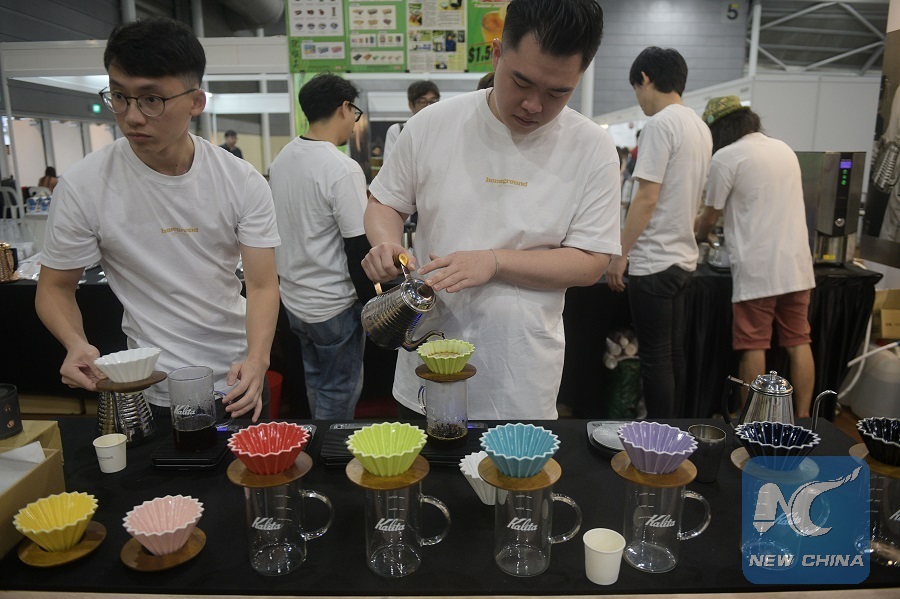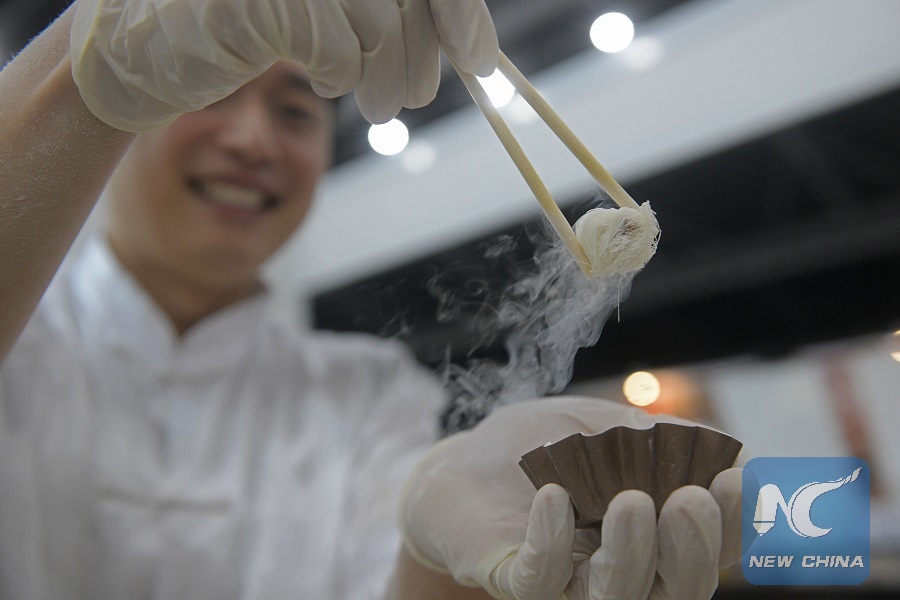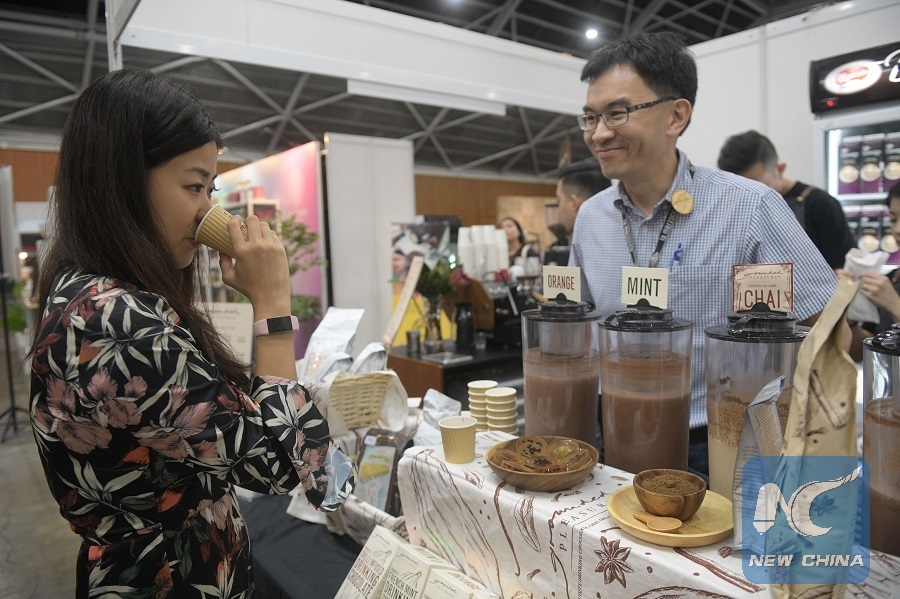
An exhibitor brews coffee for tasting at the exhibition "La Kopi" held in Singapore Expo,Singapore, Jan. 25, 2019. (Xinhua/Then Chih Wey)
by Toh Ee Ming
SINGAPORE, Jan. 27 (Xinhua) -- Faye Sai recalled how the rich smell of coffee would permeate the air as she played at her grandfather's kopitiam (local coffee shop) in Telok Blangah in southern Singapore with her siblings, before helping out during the weekends at the age of 13.
The 32-year-old was among some 70 vendors present at the inaugural La Kopi 2019 - billed as a one-of-a-kind heritage-driven coffee consumer festival.
Held at the Singapore Expo Hall from Friday to Sunday, the event saw a live barista competition, a playground that features a sandpit and childhood games like marbles, hopscotch and five stones, world-renowned roasters, as well as various local vendors that pay tribute to Singapore's rich heritage.
Sai's family business dates back to 1935, when her grandfather started San Hai Yuan coffee house in Keppel, in the south of Singapore. Her father then set up Coffee Break in Boon Tat Street, before relocating to the second floor of Amoy Street Food Center in 1999.
Later, Sai saw the need to preserve the Hainanese heritage of brewing traditional Nanyang coffee. Hainanese refers to people in Singapore originated from Hainan Province in China.
Sai then took a leap of faith from her events and marketing job to plunge into the coffee industry in 2012, along with her brother. Her twin sister joined the duo in 2015.
Today, Coffee Break's bestselling drinks include new and imaginative creations with a twist, like sea salt caramel latte, taro vanilla milk, and black sesame latte - as a testament to her father's encouragement to "constantly innovate and never stop improving." Some of the flavors are also inspired by exotic travels to places like Iran.
In fact, the older generation working nearby have developed a taste for its more experimental flavors, while younger customers are curious about the different variations of traditional kopi (coffee) and how it is brewed using the coffee sock.
"It's a (two-way exchange), the young learn from the old, and vice versa... To me, it's a fulfilling experience to be able (to) marry both the traditional and specialty elements together and keep this culture alive," said Sai, who now runs the second Coffee Break outlet at Kent Ridge.
For most Singaporeans, drinking coffee from local coffeeshops has become a way of life, though in recent years, there has been a wave of cafes which brew artisan coffee. To keep up with the competition, traditional coffee roasters are also ramping up their offerings.
Similar to Sai, Tan Hao Xiang, 27, who helped out at his father's factory in Jurong during his childhood, never imagined that he would end up in the coffee industry full-time. He witnessed his father toiling away from dawn to midnight, doing backbreaking work roasting, grinding, packing, and supplying the coffee.
His father, Tan Song Lee, 61, runs Tan Lee Et Food Industry, an established traditional coffee roaster based in Singapore with more than 30 years of experience since 1982.
"It's a lot of blood and sweat... Everything has to be precise, from ensuring the temperature is just right, roasting it batches by batches and so on," he said.
In 2014, after attending a coffee roasting class which featured international coffee experts from Thailand and Indonesia, the younger Tan became interested in artisan coffee and took up graded courses in roasting Arabica and Robusta coffee.
Since joining the family business as its operations and sales associate in 2012, Tan has a newfound mission to preserve his father's legacy, while reaching out to new customers in the online marketplace by expanding into a new line of gourmet coffee beans imported from Brazil, Costa Rica, Ethiopia, Tanzania, among others.
"Many people think that the local coffee business in Singapore is a sunset industry, but there are a few players in the market that are trying to keep this heritage alive, while striking a balance to relieve some of the laborious work involved," said the younger Tan, who plans to ramp up its outreach to consumers this year and to organize coffee cupping classes.

An exhibitor makes a creative quick-freezed "dragon-beard" candy at the exhibition "La Kopi" held in Singapore Expo, Singapore, Jan. 25, 2019. (Xinhua/Then Chih Wey)
The festival also showcased traditional desserts and pastries. Among them was Kueh Garden, which supplies traditional pastries like handmade "ang ku kueh" (a small round or oval shaped pastry with soft sticky glutinous rice flour skin wrapped around a sweet filling in the center).
While Kueh Garden believes that such local pastries will always be a staple in Singapore's culture, it also seeks new ways to capture customers.
For instance, it does not use preservatives, and ensures there is less salt and less sugar for a "healthier option," said its co-founder Kym Tan, 65.
Knowing that the younger crowd would be drawn by the novelty factor, the team came up with a Milo (Singaporeans' favorite chocolate malt drink)-flavored ang ku kueh - a change from its usual flavors of red bean, peanut, durian, sweet potato, corn, for instance.
The store was set up in 2016 after Tan and her husband sought tutelage from the famous "146 Ang Ku Kueh" (or Lim Lam Hong Confectionery at Jalan Bukit Merah).
Tan starts her work day at 5:00 a.m. in the morning to make the pastries from scratch, and the team can make close to 300 ang ku kueh a day, or between 1,000 to 2,000 ang ku kueh during the Chinese New Year period.

A visitor samples some drinks at the exhibition "La Kopi" held in Singapore Expo, Singapore, Jan. 25, 2019. (Xinhua/Then Chih Wey)
As public milled about the booths, they eagerly peppered the vendors with questions about their produce and were treated to free samples.
Brandon Chang, 43, who works in interior design, saw it as a good opportunity to shop around for coffee and enjoy the "personalized" experience. He makes the monthly trip from his home in Woodlands to an independent local, traditional coffee roaster in Tai Seng to stock up on his coffee beans.
"As consumers, we get to recognize and appreciate the efforts of these small businesses. By speaking to them, you learn more about coffee and the passion behind their craft," he said.

